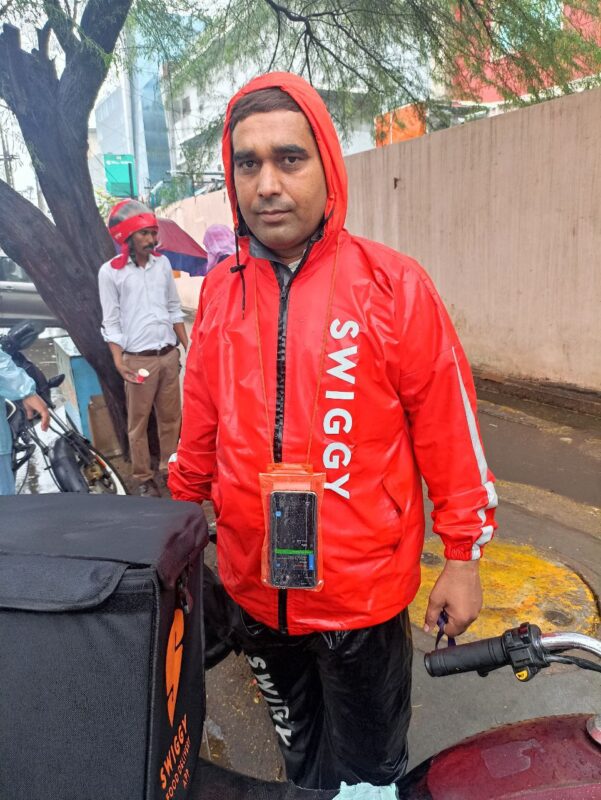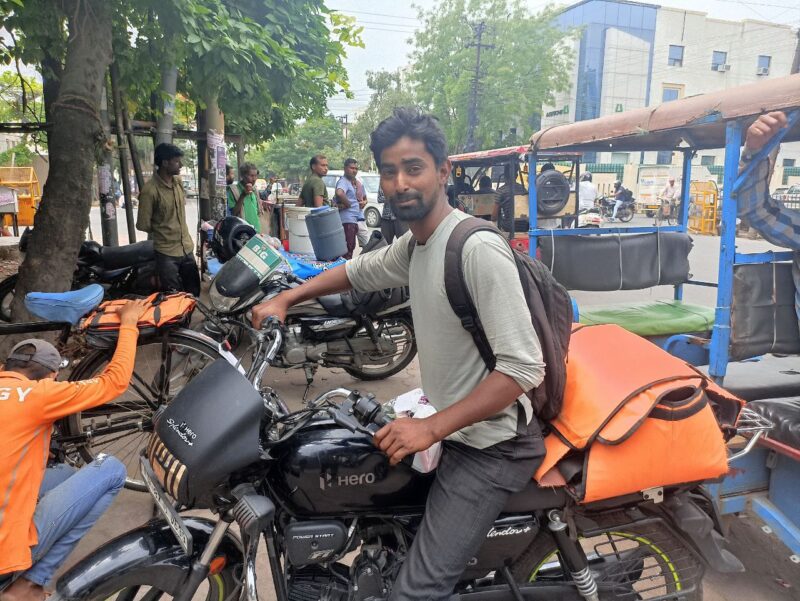With incidents of violence against them on the rise, the status of online delivery executives in Delhi and the National Capital Region (NCR) remains dismal and apathetic.
One recent incident that shook the Capital was the demise of a 39-year-old food delivery executive Pankaj Thakur on Saturday. Thakur was beaten to death by two cab riders, identified as Manish Kumar and Lalchand and residents of Shadipur, over a heated argument over parking space.
The cab drivers beat Pankaj to unconsciousness and then left him on the road. Pankaj was then taken to the nearest hospital by the residents of his colony where he was declared dead.
The accused have been arrested, but Thakur’s family, which includes his wife and two children, is now on their own, facing uncertainty about their future.
However, this was not the first time a food delivery executive faced customers’ wrath.
Patriot talked to delivery agents from the Delhi-NCR region to learn about the challenges and problems they experience on the job.
Sushil Yadav, 32, a migrant from Gorakhpur, reflects on the recent incidents and states, “One of the main reasons these incidents keep happening is because of the mentality of people. They think of us as their slaves and try to belittle us.”
Yadav further adds, “It’s a sad fact. I’ve been working in this industry since the last eight years and as time has progressed, you would expect people to be more understanding and compassionate. But literally, the situation is the same as it used to be 50 years ago, when people would treat the low caste communities badly. It feels like we’ve become those people in the modern age.

Yadav says he faces discrimination every day.
“I deliver 25 to 30 orders a day, and every day I encounter issues where you’re not allowed to use the lift or people ask you to use the pantry’s lift, which is always stocked up. You often have to wait for hours, which causes delays, adding to the multiple other reasons. Then the customers shout at you like you’ve caused the delay intentionally. People are more concerned about their deliveries rather than our safety, they think we have some magic vehicle in which we’ll fly and reach them in seconds.”
Misbehaving with executives has become a common practice, and it has increased even more after the pandemic.
Yadav adds further, “I earn around 700-800 rupees a day, for which I travel around 50 kilometres a day. After working for 12 to 14 hours, you get yelled at and hear slurs. It is saddening.”
He remembers an incident where the restaurant was responsible for delaying an order, causing the customer to verbally abuse him for the delay. This experience was so degrading that he decided to quit his job and look for other opportunities. Unfortunately, the pandemic began, which made it difficult for him to find other employment. Additionally, job opportunities have been limited since then.
Difficult times
The situation is not good for electronic ride-hailing services and food delivery workers in the capital city. In February, Rapido, an online service provider, was prohibited from operating in Delhi. Additionally, a large number of workers for Blinkit, an online grocery delivery platform, are on strike in Delhi, demanding better wages for their deliveries.
These occurrences have already affected the livelihoods of many individuals who rely on these jobs. Moreover, to compound matters, there have been frequent instances of mistreatment, verbal abuse, and even fatalities in some cases.
Sagar, 26, expresses his predicament working as a delivery person and believes that the wages given to delivery executives should be increased.
“Currently, we receive 80 rupees for a 10-kilometre order, and we have to cover the same distance on our way back. It means we are effectively travelling 20 kilometres for 80 rupees, which is equivalent to four rupees per kilometre. How can we manage on such low wages.”
Sagar also highlights the challenges he faces in his job. Most customers expect the delivery person to bring food to their doorstep, but this is not always possible, especially in places where entry is restricted. Like some societies don’t allow entry late at night. Some customers don’t seem to understand this and become unreasonable.
Sagar cites an example of a recent experience in New Ashok Nagar where he had to deliver an order at 1 am. The customer, who had placed the order, requested him to come to the eighth floor, but the security guard did not allow entry. The customer began shouting and threatened to file a complaint, and Sagar had to wait for half an hour before eventually going up to the customer’s house.
Sagar emphasises that while some customers treat delivery executives with respect, almost half of them do not, which is disheartening.
Sagar also shares his experience as an OLA bike driver before becoming a food delivery executive. He says that the safety of the drivers was not given much importance, and even small delays would make customers very angry.

As a new driver, he also tried to maintain good ratings and reach his destinations on time, which resulted in a few minor accidents. After a brief period, he left the job and started working with Zomato. However, he found that the behaviour of customers was still the same.
Things have improved
On the other hand, Devratan Sahu, aged 28, has a different opinion. He believes that the situation has improved, especially in the Noida region, and the communication between the company and customers has become more transparent, which has reduced complications for delivery personnel. He acknowledges that there used to be cases of phone snatching and customers refusing to pay, especially late at night, but he believes that such situations are improving.
He also adds that a little bit of banter while coordinating with customers is part of every profession that involves customer service, not just food delivery. He says similar situations can arise in a shop too.
Ravi Singh, 22 who is a student and used to work part-time as a delivery boy with Swiggy tells Patriot, “It became very hard to manage both the aspects as in the latter stages, the majority of the orders assigned to me were of huge distances, taking up a lot of time and the returns are somewhat minimal only.”
Singh further adds, “I worked for around eight months earlier. It was good as I was managing both, work and studies, but later on things got bad. When I tried to point out the issue and get it resolved, the company said you’ll have to register again which was a lengthy process and the problem still remained the same. So eventually I had to give up.”





